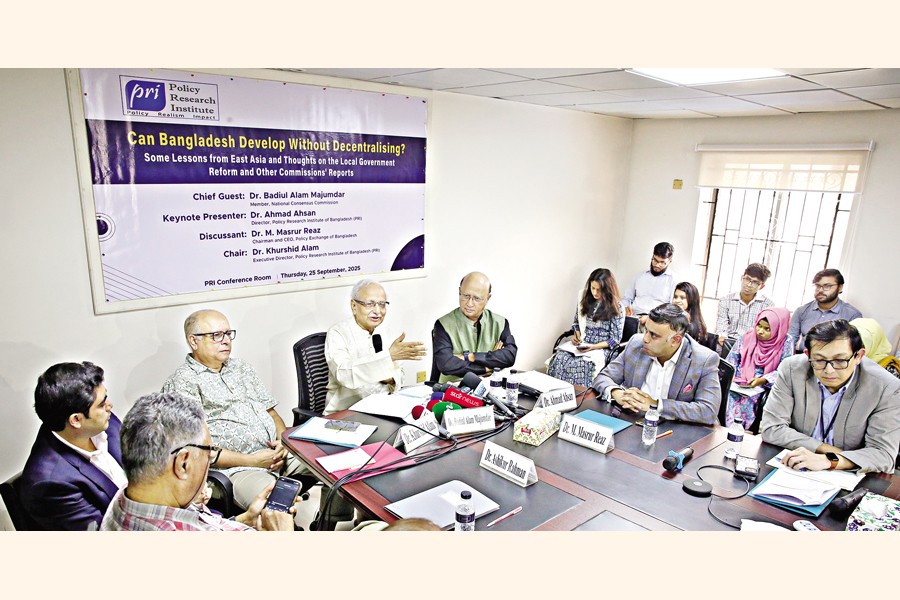
Published :
Updated :

Bangladesh lags far behind other lower-middle-income countries (LMICs) in allocations for local governments despite rapid urbanisation that has brought nearly 45 per cent of its population into cities.
LMICs spend about 20 per cent of their national budgets -- or around 6.0 per cent of GDP -- on local governments, while Bangladesh allocates only 7.0 per cent of its national budget, equivalent to just 1.0 per cent of GDP, reveals a study of the Policy Research Institute of Bangladesh (PRI).
Dr Ahmad Ahsan, Director of PRI, presented the paper at a seminar titled "Can Bangladesh Develop Without Decentralising? - Some Lessons from East Asia and Thoughts on the Local Government Reform and Other Commissions' Reports", arranged at the PRI office on Thursday.
Dr Ahsan noted that about 78 per cent of all loans in Bangladesh are concentrated in Dhaka and Chattogram, leaving smaller towns and rural areas severely underfunded.
"This heavy concentration undermines inclusive growth and employment generation. Bangladesh is one of the most centralised countries in the world compared to its size," he said.
Dr. Badiul Alam Majumdar, Member, the National Consensus Commission, spoke as chief guest at the event chaired by Dr. Khurshid Alam, Executive Director of PRI.
"We have developed, but have we truly progressed?" asked Dr Majumdar about living standards.
He argues that political reform is indispensable to bringing about positive changes.
"If politics continues to operate as a business rather than a public service, individuals with integrity will remain reluctant to enter the arena, and change will remain on paper, as usual," he warned.
He concluded by focusing on the principle of subsidiarity, the idea that problems should be solved at the level closest to where they arise, as the guiding motto for decentralization in Bangladesh.
In his opening remarks, Dr Khurshid Alam emphasised the need for inclusive dialogue on strengthening local-government institutions as a cornerstone of governance reforms.
"Economic activities in Bangladesh remain heavily concentrated in Dhaka and Chattogram divisions, particularly within the metropolitan areas of these cities," said Dr M. Masrur Reaz, Chairman and CEO of the Policy Exchange of Bangladesh.
He said that overconcentration leads to acute congestion in Dhaka, with traffic jams alone resulting in an estimated annual economic loss of $4.0 billion.
He stressed the need to connect local governments with central-government initiatives in a more coordinated and planned manner to reduce wastage and maximize public service delivery.
Presenting the keynote, Dr Ahmad Ahsan argued that decentralisation is critical for sustaining urbanisation and economic development.
He said Bangladesh's local governments remain weak, operating under fragmented authority.
Twelve city corporations and 325 municipalities function across more than 40 ministries and agencies, leaving mayors and local councils with little ability to coordinate water, power, education, health or infrastructure services.
The PRI research recommends increasing local-government allocations by at least 1.0 per cent of GDP initially, strengthening property-tax collection in Dhaka and Chattogram -- currently just 0.13 and 0.06 per cent of GDP, respectively.
The PRI also urges introducing annual scorecards to assess service delivery and financial management.
Despite remarkable economic progress over the past four decades, experts warned, Bangladesh's centralised governance structure is now becoming a barrier.
Unequal credit flows, poor rural services, and weak local accountability risk slowing down both growth and improvements in the quality of people's life.
jahid.rn@gmail.com


 For all latest news, follow The Financial Express Google News channel.
For all latest news, follow The Financial Express Google News channel.